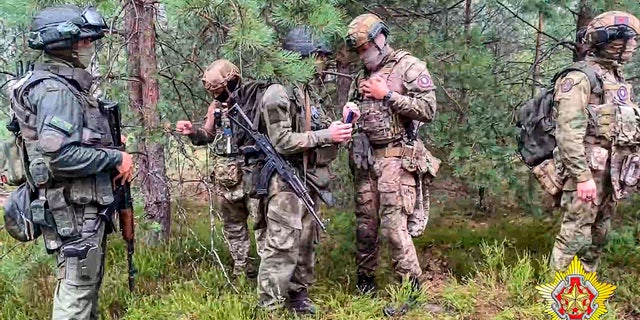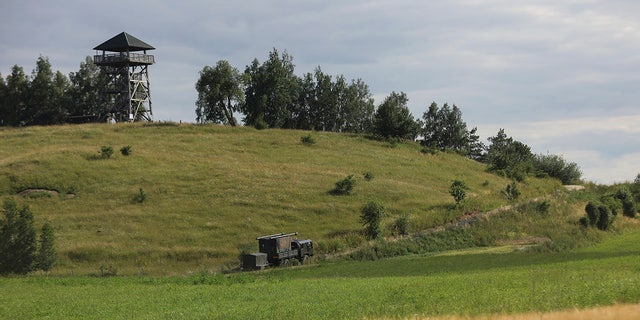Poland PM accuses Russian Wagner mercenaries of plan to ‘destabilize’ NATO, holds urgent meeting along border
Polish Prime Minister Mateusz Morawiecki accused Russian Wagner mercenaries in Belarus of trying to “destabilize” NATO through planned “hybrid attacks” along the eastern flank.
Morawiecki and Lithuanian President Gitanas Nauseda held an urgent meeting Thursday in a strategically sensitive area where their NATO nations border Belarus and the Russian territory of Kaliningrad, warning that they are bracing for provocations from Moscow and Minsk in the area.
Morawiecki and Nauseda met in Suwalki, a town in the Suwalki Gap, a sparsely populated stretch of land running 60 miles along the Polish-Lithuanian border.
Also known as the Suwalki Corridor, the stretch of territory links the three Baltic states of Lithuania, Latvia and Estonia with the rest of the NATO alliance. It separates Belarus, an ally of Russia, from Kaliningrad, a heavily militarized exclave of Russia located on the Baltic Sea that is separated from the Russian mainland.
POLAND’S PM REPORTEDLY WARNS RUSSIAN MERCENARY GROUP WAGNER FORCES MOVING CLOSER TO NATO COUNTRY’S BORDER
“Our borders have stopped various hybrid attacks for years. Russia and Belarus are increasing their numerous provocations and intrigues in order to destabilize the border of NATO’s eastern flank,” Morawiecki said. “Today, the Polish borders and the border of Lithuania are the borders of the free world, which are stopping the pressure from the despotism from the east.”
Nauseda said that any decision to close its border with Belarus should be done “in a coordinated way between Poland, Lithuania and Latvia,” according to national broadcaster LRT.
The meeting came two days after two Belarusian helicopters briefly flew at low altitude into Polish airspace in what was viewed as a provocative move.
Both nations on NATO’s eastern flank have increased their border security following the arrival of thousands of Russia-linked Wagner group mercenaries just across their borders in Belarus after an aborted mutiny in Russia in June.
“Russia and Belarus are increasing the pressure on the borders, increasing the number of their provocations, and we must be aware that the number of these provocations will grow,” Morawiecki added at the press conference with Nauseda.
The Belarusian Foreign Ministry denied that its country’s helicopters entered Poland. Anatoly Glaz, press secretary of the Belarusian Foreign Ministry, said Thursday that the charge d’affaires of Poland was summoned to the Ministry of Foreign Affairs in Minsk and told that Poland had come to a hasty conclusion.

“We call on the Polish side not to escalate the situation and not use it to militarize the border area,” Glaz said.
POLAND’S GOVERNMENT SAYS COUNTRY’S TOP PRIORITY IS SECURING EUROPEAN UNION’S BORDER WITH RUSSIAN ALLY BELARUS
Local Polish residents on Tuesday posted photos on social media of helicopters with Belarusian insignia flying above.
Military analysts in the West have long viewed the Suwalki Gap as a potential flashpoint area in case of a standoff between Russia and NATO. They worry that if Russia were to ever seize the Suwalki Gap, it would leave Lithuania and the other two Baltic states cut off from Poland and other NATO allies.
Nauseda said he believes the Suwalki Gap remains a vulnerable place, even though Sweden – located across the Baltic Sea – is on track to join NATO.

“Some people say the agreement reached at the NATO summit on Sweden’s future membership is changing the geopolitical situation, and the strategic importance of the Suwalki Corridor is diminishing. I certainly do not agree with this view and I believe that the Suwalki Corridor remains a potential target of provocation by both Russia and Belarus,” Nauseda said.
Morawiecki has previously warned that Wagner forces were moving through Belarus closer to the border with Poland, suggesting that the Russian mercenaries could disguise themselves as Belarusian border guards to help usher migrants across the border. The NATO countries on the eastern flank have felt under pressure for a couple of years.
Large numbers of migrants from the Middle East and Africa began arriving two years ago at the borders of Poland, Lithuania and Latvia. European leaders have accused Belarus leader Alexander Lukashenko, an ally of Russian President Vladimir Putin, of opening the migration route in an act of “hybrid warfare” aimed at creating instability in the West.
The Associated Press contributed to this report.
Read the full article Here


